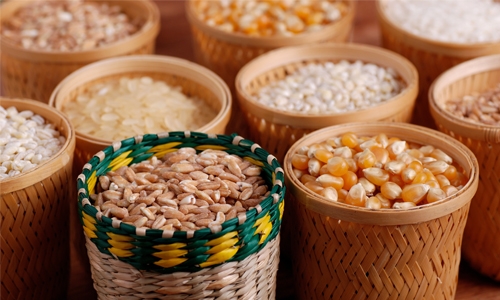Whole Grains Diet
Grains, especially whole grains, are an essential part of a healthy diet. All types of grains are good sources of complex carbohydrates and some key vitamins and minerals. Grains are also naturally low in fat.
Overall studies indicate that regular whole grain consumption protects us from certain chronic diseases, such as cardiovascular disease, metabolic syndrome, type 2 diabetes, and cancer.
Types of Grains
Whole grains include the entire grain seed, called the kernel, which consists of three components: bran, germ, and endosperm. Whether the kernel has been cracked, crushed, or flaked, it must retain the same relative proportions of these components to be called a whole grain.
Examples of whole grains are bulgur, oats, brown rice, buckwheat, corn, and quinoa.
Refined grains have been processed (milled) to remove the bran and germ to create a finer texture and improve shelf life, but this process removes the dietary fibre, iron, and many B vitamins.
Examples White flour, white rice, bakery products etc are made from refined grains.
Enriched grains are those, which have specific nutrients such as vitamin B and iron returned to them, after these nutrients getting lost during processing.
Benefits of whole grains
Whole grains are rich sources of vitamins, minerals, dietary fibre, several photochemical, all of which have positive effect on health.
• B vitamins: thiamin (Vitamin B1), riboflavin (Vitamin B2), niacin (Vitamin B3) and folate (Vitamin B9) are important in many biological functions.
• Folate (folic acid), one of the B vitamins, helps the body form new cells and can prevent certain birth defects.
• Iron is necessary to carry oxygen in blood.
• Magnesium is a mineral involved in over 300 processes in the body.
• Selenium is important for a healthy immune system and regulating thyroid hormone action.
To prevent diseases
Eating whole grain instead of refined grains substantially lowers total cholesterol, low-density lipoprotein (LDL, or bad) cholesterol, triglyceride, and insulin levels.
The evidence for the benefit of whole grains against cardiovascular disease is strong and studies have shown that consuming whole grains is associated with a reduced risk of cardiovascular disease.
A recent systematic review shows that whole grain intake of 48 to 80 g daily (three to five servings) resulted in 21 per cent lower risk of cardiovascular disease compared with who consumed refined grain.
Fibre being an important component helps lower cholesterol move waste through the digestive tract and prevent the formation of small blood clots that can trigger heart attacks or strokes.
The possibility of developing hypertension, a major risk factor for cardiovascular disease, is also lower among those who consume whole grains. Guideline for hypertension recommends 6 serving of whole grains daily, which provide plenty of fibre and other minerals like potassium, linked to lower blood pressure.
Diabetes and Cancer
Studies indicate that people who consume more whole grains have improved insulin resistance and decreased risk of developing type 2 diabetes. Whole grains contain bran and fibre, which slow the breakdown of starch into glucose – thus maintaining a steady blood sugar level, rather than causing sharp spikes.
Several whole grain components can have a positive effect on gastrointestinal health, including fibre, oligosaccharide, phytochemical, antioxidant vitamins, and minerals.
These components may act together to prevent cancer and inflammation while strengthening barrier function and providing immune support. It was found that there was a 20pc reduction in the risk of colorectal cancer for every three servings of whole grains per day.
Recommendations
The 2010 Dietary Guidelines suggest to make at least one half of the grains in diet, whole grains. The recommended amount of whole grain is 48 g/ day( i.e 3 serving)
Tips to add whole grain in diet
• Have instant oatmeal at breakfast, adding their own fruit or sweetener to maintain the healthfulness.
• Enjoy popcorn as a snack but without adding it in butter.
• Serve corn on the cob or canned corn as a side dish.
• Mix their usual refined breakfast cereal with a whole grain cereal, gradually increasing the amount of whole grain cereal.
• Choose whole grain bread, rolls, buns, pitas, or tortillas for sandwiches, wraps, and tacos.
• Choose whole grain crackers for snacking.
• Substitute one-half of the white flour with whole wheat flour when baking cookies, muffins, and pancakes.
• Buy whole grain pasta.
Related Posts

